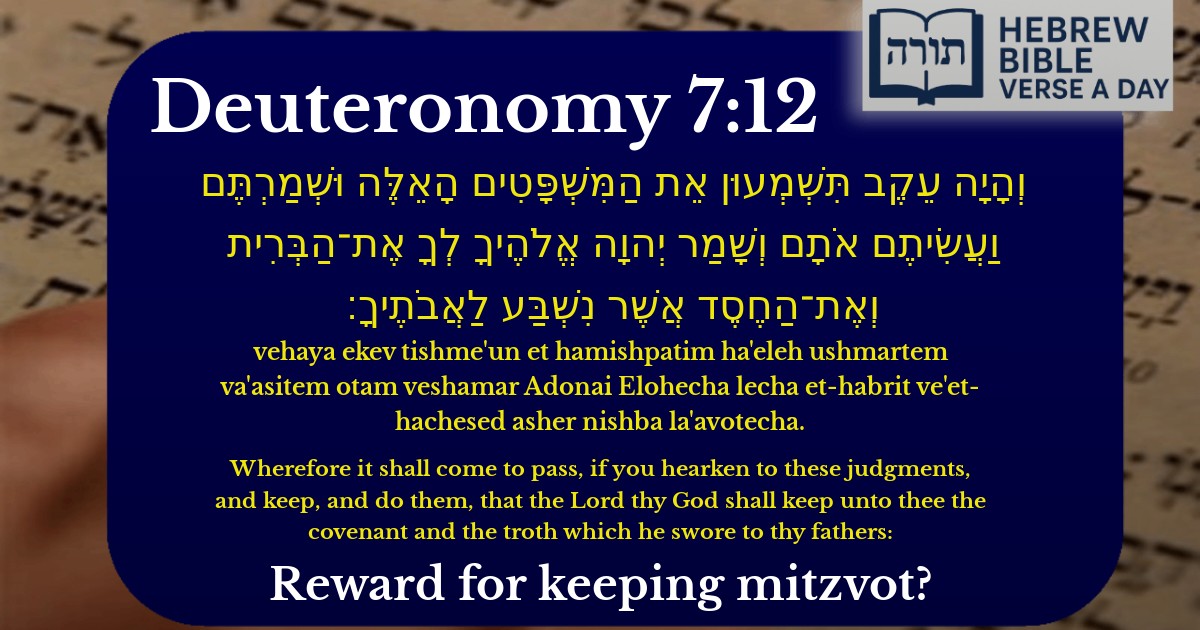Join Our Newsletter To Be Informed When New Videos Are Posted
Join the thousands of fellow Studends who rely on our videos to learn how to read the bible in Hebrew for free!
Hebrew Text
וְהָיָה עֵקֶב תִּשְׁמְעוּן אֵת הַמִּשְׁפָּטִים הָאֵלֶּה וּשְׁמַרְתֶּם וַעֲשִׂיתֶם אֹתָם וְשָׁמַר יְהוָה אֱלֹהֶיךָ לְךָ אֶת־הַבְּרִית וְאֶת־הַחֶסֶד אֲשֶׁר נִשְׁבַּע לַאֲבֹתֶיךָ׃
English Translation
Wherefore it shall come to pass, if you hearken to these judgments, and keep, and do them, that the Lord thy God shall keep unto thee the covenant and the troth which he swore to thy fathers:
Transliteration
Vehaya ekev tishme'un et hamishpatim ha'eleh ushmartem va'asitem otam veshamar Adonai Elohecha lecha et-habrit ve'et-hachesed asher nishba la'avotecha.
Hebrew Leining Text
וְהָיָ֣ה ׀ עֵ֣קֶב תִּשְׁמְע֗וּן אֵ֤ת הַמִּשְׁפָּטִים֙ הָאֵ֔לֶּה וּשְׁמַרְתֶּ֥ם וַעֲשִׂיתֶ֖ם אֹתָ֑ם וְשָׁמַר֩ יְהֹוָ֨ה אֱלֹהֶ֜יךָ לְךָ֗ אֶֽת־הַבְּרִית֙ וְאֶת־הַחֶ֔סֶד אֲשֶׁ֥ר נִשְׁבַּ֖ע לַאֲבֹתֶֽיךָ׃
Parasha Commentary
📚 Talmud Citations
This verse is quoted in the Talmud.
📖 Berakhot 48b
The verse is referenced in a discussion about the importance of observing commandments and the rewards for doing so, particularly in the context of the covenant between God and the Jewish people.
📖 Avodah Zarah 5a
The verse is cited in a discussion about the consequences of heeding or neglecting the commandments, emphasizing the reciprocal nature of the covenant.


Understanding the Verse
The verse (Devarim 7:12) begins with the phrase "וְהָיָה עֵקֶב תִּשְׁמְעוּן" ("And it shall come to pass, because you hearken..."), emphasizing the cause-and-effect relationship between observing the mitzvot and Hashem's fulfillment of His covenant. The term "עֵקֶב" (ekev) is significant—Rashi explains that it refers to the "lesser" or seemingly minor mitzvot that people tend to overlook, suggesting that even these are crucial for maintaining the covenant.
The Dual Obligation: Hearing and Doing
The verse lists three actions: "תִּשְׁמְעוּן" (hearken), "וּשְׁמַרְתֶּם" (keep), and "וַעֲשִׂיתֶם" (do). Ramban (Nachmanides) explains that these correspond to different levels of commitment:
Hashem's Reciprocal Commitment
The verse concludes with Hashem's promise to uphold "הַבְּרִית וְאֶת־הַחֶסֶד" (the covenant and the kindness). The Sforno notes that "chesed" here refers to the unconditional love Hashem swore to the Avot (Avraham, Yitzchak, and Yaakov), which transcends strict justice. The Talmud (Berachot 32b) teaches that even when Bnei Yisrael falter, Hashem's covenant remains steadfast due to this ancestral merit.
Midrashic Insight
The Midrash Tanchuma (Eikev 3) connects this verse to the concept of שכר מצוה מצוה—the reward for a mitzvah is the opportunity to perform another mitzvah. By observing the mitzvot, we merit continued closeness to Hashem and the perpetuation of His covenant.